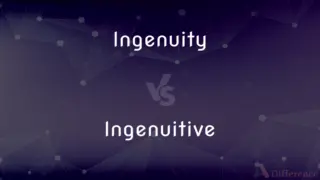Noninteresting vs. Uninteresting — Which is Correct Spelling?
Edited by Tayyaba Rehman — By Fiza Rafique — Updated on May 8, 2024
Noninteresting is the incorrect spelling. Uninteresting means lacking interest or excitement.

Table of Contents
Which is correct: Noninteresting or Uninteresting
How to spell Uninteresting?

Noninteresting
Incorrect Spelling

Uninteresting
Correct Spelling
ADVERTISEMENT
Key Differences
Remember that "un-" means "not," as in "unhappy," so "uninteresting" means "not interesting."
"Non" often combines with nouns (e.g., non-smoker), while "un-" combines with adjectives.
Think of "non-" as "nonexistent," something that doesn't exist, while "uninteresting" simply lacks interest.
How Do You Spell Uninteresting Correctly?
Incorrect: Noninteresting movies don't hold my attention.
Correct: Uninteresting movies don't hold my attention.
Incorrect: The book was noninteresting and dull.
Correct: The book was uninteresting and dull.
ADVERTISEMENT
Incorrect: The presentation seemed noninteresting to the audience.
Correct: The presentation seemed uninteresting to the audience.
Incorrect: He found the lecture noninteresting and boring.
Correct: He found the lecture uninteresting and boring.
Incorrect: Her noninteresting hobbies included watching paint dry.
Correct: Her uninteresting hobbies included watching paint dry.
Uninteresting Definitions
Lacking interest or excitement.
The novel was uninteresting and predictable.
Monotonous or boring.
His uninteresting delivery put the class to sleep.
Not appealing or attractive.
The show was uninteresting compared to the newer ones.
Failing to hold attention or engage.
The speech was uninteresting and repetitive.
Dull or tedious.
The task was uninteresting and required little skill.
Arousing little or no interest or curiosity; boring.
Arousing little or no interest; boring or uneventful.
Arousing no interest or attention or curiosity or excitement;
A very uninteresting account of her trip
Characteristic or suggestive of an institution especially in being uniform or dull or unimaginative;
Institutional food
Uninteresting Meaning in a Sentence
The professor's lecture was uninteresting and long.
The uninteresting game failed to entertain the crowd.
The book had an uninteresting plot with no twists.
His uninteresting stories made the meeting drag on.
She considered the topic uninteresting and tedious.
Her uninteresting response didn't satisfy the interviewer.
I found the article to be uninteresting and dry.
The documentary was uninteresting and lacked excitement.
The uninteresting job required little creativity.
The presentation was uninteresting, leaving many people yawning.
The movie was uninteresting from start to finish.
His uninteresting explanations confused the class even more.
The documentary covered an uninteresting topic.
The team's uninteresting strategy led to a quick defeat.
I found the uninteresting movie plot predictable.
The uninteresting puzzle had too few challenging elements.
The uninteresting assignment didn't challenge the students.
The uninteresting characters made the novel hard to finish.
Her uninteresting attitude made the conversation dull.
The uninteresting report was filled with technical jargon.
I skipped the uninteresting TV show to read a book instead.
His uninteresting jokes didn't make anyone laugh.
The museum exhibit was uninteresting and outdated.
The play had uninteresting dialogue and a weak storyline.
The article provided uninteresting facts and statistics.
Uninteresting Idioms & Phrases
Uninteresting conversation
A talk that lacks engagement.
Their uninteresting conversation left everyone bored.
Uninteresting to a fault
So boring that it becomes noticeable.
His speech was uninteresting to a fault.
Uninteresting hobby
A pastime that doesn't captivate.
Her uninteresting hobby was collecting old receipts.
Uninteresting job
Work that is dull and tedious.
He left his uninteresting job for something more exciting.
Uninteresting presentation
A speech or display that doesn't impress.
The uninteresting presentation put the audience to sleep.
Uninteresting topic
A subject that doesn't draw attention.
The uninteresting topic of the lecture bored the students.
Uninteresting plot
A storyline that fails to engage.
The book's uninteresting plot made me stop reading.
Uninteresting as a brick wall
Very dull or tedious.
His uninteresting stories were like talking to a brick wall.
Uninteresting dialogue
Conversations in a story that lack depth.
The uninteresting dialogue made the play drag on.
Uninteresting character
A person in a story lacking personality.
The uninteresting character added nothing to the plot.
Uninteresting as watching paint dry
Extremely boring.
The class was uninteresting as watching paint dry.
Uninteresting piece of work
A project that lacks creativity.
The uninteresting piece of work didn't impress the boss.
Uninteresting problem
A challenge that's not worth solving.
The uninteresting problem didn't require much thought.
Uninteresting habit
A repetitive behavior that isn't engaging.
His uninteresting habit of twirling his pen was distracting.
Uninteresting to the masses
Not appealing to a large audience.
The band's uninteresting music was uninteresting to the masses.
Uninteresting narrative
A story that doesn't draw people in.
The movie's uninteresting narrative made it flop at the box office.
Uninteresting and dry
Boring and without creativity.
The presentation was uninteresting and dry.
Uninteresting show
A display or performance that lacks excitement.
The uninteresting show struggled to find an audience.
Uninteresting and monotonous
Boring and repetitive.
His uninteresting and monotonous lectures were hard to follow.
Uninteresting style
A way of doing things that isn't unique.
Her uninteresting style made her paintings blend in with others.
Common Curiosities
How do we divide uninteresting into syllables?
un-in-ter-est-ing.
How is uninteresting used in a sentence?
e.g., The book was uninteresting and predictable.
Why is it called uninteresting?
The prefix "un-" means "not," so uninteresting means "not interesting."
What is a stressed syllable in uninteresting?
The first syllable, "un-," is stressed.
What is the verb form of uninteresting?
The verb form is "uninterest."
What is the pronunciation of uninteresting?
/ʌnˈɪn.tər.ə.stɪŋ/
What is another term for uninteresting?
Boring.
What is the root word of uninteresting?
The root word is "interest."
How many syllables are in uninteresting?
Five.
Is uninteresting a noun or adjective?
Adjective.
Is uninteresting an abstract noun?
No.
Is uninteresting an adverb?
No.
Is uninteresting a negative or positive word?
Negative.
Is uninteresting a countable noun?
No.
Which determiner is used with uninteresting?
"An" (as in "an uninteresting show").
Is the word “uninteresting” a direct object or an indirect object?
It's an adjective, so it doesn't function as a direct or indirect object.
What part of speech is uninteresting?
Adjective.
What is the plural form of uninteresting?
There isn't a plural form as it's an adjective.
What is the opposite of uninteresting?
Interesting.
Is uninteresting a vowel or consonant?
It starts with a vowel (u).
Is the term uninteresting a metaphor?
No.
Is the word uninteresting gerund?
No.
Which preposition is used with uninteresting?
"To" (as in "uninteresting to the audience").
Which conjunction is used with uninteresting?
"And" (as in "uninteresting and boring").
Which article is used with uninteresting?
"An" (as in "an uninteresting speech").
What is the singular form of uninteresting?
There isn't a singular form as it's an adjective.
Is uninteresting a collective noun?
No.
Is the word uninteresting imperative?
No.
Which vowel is used before uninteresting?
"A" (as in "an uninteresting").
Share Your Discovery

Previous Comparison
Wealthful vs. Wealthfully
Next Comparison
Ingenuity vs. IngenuitiveAuthor Spotlight
Written by
Fiza RafiqueFiza Rafique is a skilled content writer at AskDifference.com, where she meticulously refines and enhances written pieces. Drawing from her vast editorial expertise, Fiza ensures clarity, accuracy, and precision in every article. Passionate about language, she continually seeks to elevate the quality of content for readers worldwide.
Edited by
Tayyaba RehmanTayyaba Rehman is a distinguished writer, currently serving as a primary contributor to askdifference.com. As a researcher in semantics and etymology, Tayyaba's passion for the complexity of languages and their distinctions has found a perfect home on the platform. Tayyaba delves into the intricacies of language, distinguishing between commonly confused words and phrases, thereby providing clarity for readers worldwide.



































